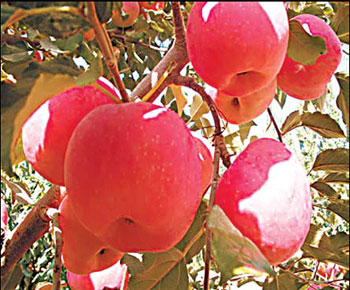

Perhaps no other region in China is more synonymous with apples than Liquan county.
Located in northwestern China's Shaanxi province, Liquan is famous as home to the world's biggest ancient imperial mausoleum - Zhaoling - for emperor Li Shimin of the Tang Dynasty (AD 618-907). Today, the small town is also noted as one of the major apple growing bases in China.
In recent years, the small county has developed a booming apple-agricultural economy, which makes better use of apple resources.

Local farmers have helped develop several kinds of industries in the apple-agricultural chain in order to generate more value, such as eco-tourism, deep processing of apple products and eco-agriculture development.
"It is a feasible option for Liquan to maintain the advantage of apple planting and generate more value for local farmers," says Sun Kuangling, head of Liquan county.
Sun prefers to describe the apple as a vital economic element for today's Liquan county.
Statistics from local government show that Liquan has sand rich in nitrogen, phosphorus and potassium, which are needed for apple planting. More than 700,000 mu of the county's 850,000 mu (56,666 hectares) of arable land is used for apple planting.
Every spring, large fruit trees attract tourists both from home and abroad.
The small town produces more than 800,000 tons of high quality apples, which contribute 6 percent of the country's total apple output.
Liquan has also emerged as Shaanxi's biggest home of fruit food processing manufacturers and juice companies, including the country's top fruit juice maker Huiyuan Group.
"From flower to fruits, local farmers can broaden the usage of natural resources during the apple-planting course," says Sun.
A new power plant is under construction in Liquan that uses twigs and branches from apples trees to generate electricity. The power plant will cost an estimated 1 billion yuan.
"It is a new type of apple resource utilization manner and it will help Liquan further develop the apple-agricultural chain," Sun says. "Once complete it will better support our eco-agriculture development."
The project is the first twig-fired power plant in China.
"The entire project is expected to be completed in early 2011," says Qian Jianzhong, general manager of Shanghai Blue Bird Environmental Development Ltd, the power plant's builder.
The technology provider decided to built the project in Liquan country because of plentiful branches from large fruit trees, Qian says.
The 720 MW power plant will require 800,000 tons of fuel a year, including both twigs and straw, the manager adds.
To help support the power plant's operation, the company will organize a local collection agency to purchase twigs and branches from local farmers. The price of twigs and branches will be around 200 yuan per ton.
"We never thought that scrap twigs also would help us generate more value," a local farmer tells China Business Weekly.
Farmers traditionally burn twigs and branches after harvest, Sun says. Using them for power generation will help the county limit burning tree trimmings, cutting carbon dioxide emissions.
According to Qian, the county expects to use the ash byproduct as fertilizer for growing apples.
"It is a golden opportunity for us to complete the apple-agriculture chain and better balance farming and business management," Sun says.
She is confident that Liquan's integrative manner of apple planting will set a good example for other western rural areas seeking feasible development strategies.
(China Daily 04/21/2008 page10)













